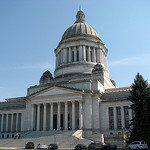Lawmakers compromise on oil trains
 The Legislative Building of the Washington State Capitol, Olympia.
The Legislative Building of the Washington State Capitol, Olympia.
April 27, 2015 - 7:00 am
By John Stang
Heavy on trains and pipelines, but no Puget Sound oil spill prevention measures. That about sums up a Washington House-Senate compromise on their competing oil transportation safety bills.
The Senate passed the compromise, 46-0, on Friday. Shortly after, the measure got a resounding 95-1 Yes from the House.
“It’s an above-average bill,” said Sen. Christine Rolfes, D-Bainbridge Island, just before the Senate vote. ”It’s three-quarters of a good bill.”
The legislation covers oil trains and pipelines, and addresses some other oil-transportation safety matters, such as spill-related emergency training and responses and providing information about oil train cargoes and schedules to the public and to emergency response agencies. The new bill also imposes a temporary, three-year oil-tax hike (from the current 4 cents per 42-gallon barrel to 5 cents).
House Democrats had originally pushed for a per-barrel tax of 8 cents, plus some oil spill prevention measures for tanker ships plying Puget Sound — positions they ultimately conceded. Senate Republicans gave ground too, on their original opposition to any oil tax increase at all, and on their no-pipelines stance. Both sides had pushed for improved training and planning by state and local emergency agencies.
Rep. Jessyn Farrell, D-Seattle and author of the House bill, said the compromise was made to get some oil train and pipeline legislation on the books. Democrats hope to tackle Puget Sound-related oil-spill-prevention measures in the 2016 session.
Under the new legislation, railroads will have to provide advance notification to emergency agencies about train routes, about the volumes of oil being transported and about where oil trains traveling to western Washington’s five refineries originated. The public will be updated periodically via a website that provides a less detailed look at the oil volumes and origin of oil trains. In order to protect proprietary oil company information, the public data will not be broken down by individual trains and dates.
A similar aggregate rundown on pipelines will be made public twice a year so that the public and state will have information on which to base future regulatory actions.
The bill also requires railroads to report on whether they are financially capable of effectively responding to worst-case accident scenarios. The state will use those financial disclosures to determine whether or not to take more actions vis a vis the railroads’ financial obligations in the event of emergencies.
Environmentalists and environmentally-minded lawmakers were lukewarm about the legislation. “It isn’t a matter of if, it is a matter of when a spill or explosion will happen,” said Sen. John McCoy, D-Tulalip. “I am pleased we were able to finally pass meaningful legislation that will help protect our first responders and citizens. It’s unfortunate we could not ensure oil and railroad companies — not taxpayers — are held financially responsible for spill prevention and cleanup.”
“While this bill contains some important steps forward in terms of transparency and public disclosure, it leaves huge holes in the safety net needed to protect our communities and waterways from risks we face today,” said Becky Kelley, president of Washington Environmental Council, in a press release.
No doubt the issue of oil train safety and how to ensure it will be back.
Distributed by Crosscut Public Media



